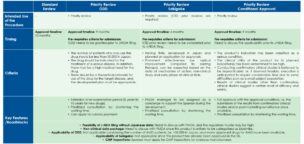
Overview: Japan’s Ministry of Health, Labour, and Welfare (MHLW) has developed specific regulatory pathways to expedite the review and approval of innovative drugs. These systems aim to address unmet medical needs and provide patients quicker access to essential treatments. Ow, we explore three key systems: Orphan Drug Designation, the Sakigake Designation System, and the Conditional Approval System. Please also refer to the attached table for a detailed comparison of these systems (to get the higher-resolution image, please contact Eliquent Japan at info@idec-inc.com).
1. Orphan Drug Designation System (ODD)
The Orphan Drug Designation System supports the development of treatments for rare diseases. To qualify for this designation, a drug must be intended to treat a disease affecting fewer than 50,000 patients in Japan. Additionally, the drug must address serious conditions with high unmet medical needs. Key features of this system include:
- Priority review with a shortened approval timeline of 9 months.
- Financial support for development costs.
- Extended market exclusivity for 10 years post-approval.
- Price premium.
This system ensures pharmaceutical companies can develop treatments for rare diseases with a shortened approval timeline.
2. Sakigake Designation System
The Sakigake (Pioneering) Designation System accelerates the approval of breakthrough therapies developed in Japan and shows prominent effectiveness in early-stage trials. Drugs under this system can expect:
- Priority review with a 6-month approval timeline.
- A designated PMDA manager who acts as a concierge, guiding the company through the regulatory process.
- Early consultation with the PMDA, even before the formal submission of the Common Technical Document (CTD).
- Price premium.
This system is tailored for drugs developed first in Japan, which show significant potential compared to existing therapies.
3. Conditional Approval System
The Conditional Approval System is designed for drugs that treat serious diseases but face challenges in completing large-scale clinical trials. It allows for early market entry based on limited clinical data, with conditions that must be met post-approval. Important aspects include:
- Priority review with a 9-month approval timeline.
- Approval based on interim clinical results, with full approval granted after post-marketing studies confirm efficacy and safety.
This system enables patients with life-threatening diseases to access new treatments earlier while additional clinical data is collected.
Conclusion: These regulatory pathways highlight Japan’s proactive stance in promoting the development of innovative treatments, especially in areas with unmet needs. For pharmaceutical companies operating internationally, understanding and utilizing these systems can significantly shorten the time-to-market for new therapies, benefiting patients and healthcare systems alike.
